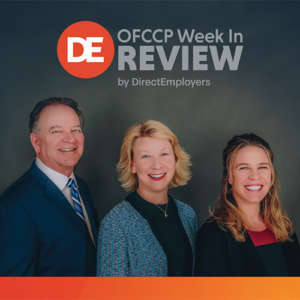
- New FLSA and FMLA Guidance on Return to Work and the FFCRA
- The NLRB Draws the Line on Abusive and Offensive Statements
- Federal Government Contractors Must Review Compensation Systems
- OFCCP Updates on Conciliation, Mediation, and the Ombuds Service
- Senate Confirmed NLRB Board Members Kaplan and McFerran To New NLRB Terms In Office
- Honoring and Educating: The Celebration of the 30th Anniversary of the ADA
Monday, July 20, 2020: New FLSA and FMLA Guidance on Return to Work and the FFCRA
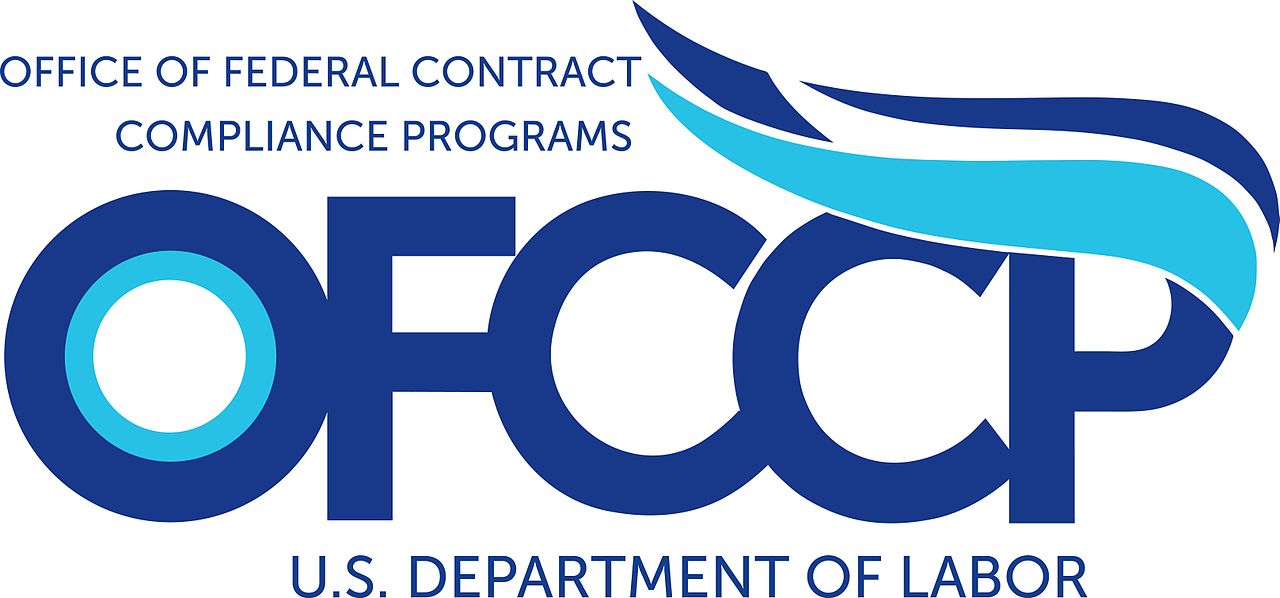
The question and answer page supporting the FLSA includes six new questions (numbers 14 -19). Highlights include:
- #14: I am an employer who allows my employees to telework during the COVID-19 emergency. Now that my employees are no longer at my worksite, how do I determine their hours of compensable work? Do I have to pay my employees for hours I did not authorize them to work? Do I have to pay them for hours worked even when they do not report those hours?
- #16: Can a salaried executive, administrative, or professional employee who is exempt from the Fair Labor Standards Act’s (FLSA’s) minimum wage and overtime requirements under Section 13(a)(1) perform other nonexempt duties during the COVID-19 public health emergency and continue to be treated as exempt?
- #17: Is hazard pay required under the Fair Labor Standards Act (FLSA) for employees working during the COVID-19 pandemic?
The question and answer page supporting the FMLA includes two new questions (numbers 12-13). These are:
- #12: Due to safety and health concerns related to COVID-19, many health care providers are treating patients for a variety of conditions, including those unrelated to COVID-19, via telemedicine. Telemedicine involves face-to-face examinations or treatment of patients by remote video conference via computers or mobile devices. Under these circumstances, will a telemedicine visit count as an in-person visit to establish a serious health condition under the FMLA?
- #13: I was out on FMLA leave unrelated to COVID-19. While I was out, my company implemented a new policy requiring everyone to take a COVID-19 test before they come to the office. Under the FMLA, can my employer require me to get a COVID-19 test under this policy?
As a reminder, other guidance provided by the WHD on FFCRA over the last few months includes:
- Fact Sheet for Employees
- Fact Sheet for Employers
- Q&A resource page on paid sick and expanded family and medical leave under the FFCRA
- Guidance poster for federal workers and one for all others as required under FFCRA
- Q&A resource page on FFCRA posting requirements
- Quick Benefits Tips to determine how much paid leave the FFCRA allows workers to take
Tuesday, July 21, 2020: The NLRB Draws the Line on Abusive and Offensive Statements
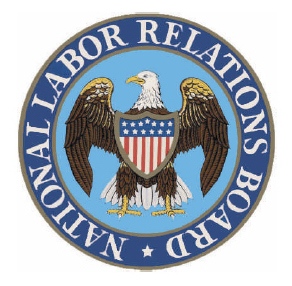
Specifically, the new General Motors decision has now adopted the Wright Line standard for unacceptable employee remarks. The Board has long applied the Wright Line standard with court approval in mixed-motive cases. The Wright Line standard now becomes the applicable standard for ALL cases involving offensive or abusive conduct in the course of an otherwise-protected activity and now replaces a previous patchwork of more specific standards the Board had previously supplied to specific circumstances.
Under Wright Line, the General Counsel must first prove that the employee’s protected activity was a motivating factor in the discipline. If so, the employer must then prove it would have taken the same action even in the absence of the protected activity. The employer may do this, for example, by showing it consistently disciplined other employees who engaged in similar abusive or offensive conduct.
This new general standard replaces a variety of previously adopted specific standards for:
- encounters with management (Atlantic Steel),
- exchanges between employees and postings on social media (a “totality of the circumstances” test), and
- offensive statements and conduct on the picket line (Clear Pine Mouldings).
While mindful that employees should enjoy some leeway for impulsive behavior when engaging in activities the Act protects, the Board concluded that these previous tests often resulted in the reinstatement of employees discharged for highly offensive conduct. These decisions were out of step with most workplace norms and were difficult to reconcile with anti-discrimination law in the view of the new Board majority.
“This is a long-overdue change in the NLRB’s approach to profanity-laced tirades and other abusive conduct in the workplace,” said Board Chairman John F. Ring. “For too long,” he added, “the Board has protected employees who engage in obscene, racist, and sexually harassing speech not tolerated in almost any workplace today. Our decision in General Motors ends this unwarranted protection, eliminates the conflict between the NLRA and anti-discrimination laws, and acknowledges that the expectations for employee conduct in the workplace have changed.”
The Case
General Motors LLC, 14-CA-197985 369 NLRB No. 127 (2020)
Wednesday, July 22, 2020: Federal Government Contractors Must Review Compensation Systems

- Fisher’s Exact test,
- Rank Sum tests such as Mann-Whitney U,
- K-Nearest Neighbor (KNN) method to predict pay,
- Cohort Analysis, and
- Multiattribute Utility Analysis (MAUT)
The group did not discuss whether Title VII law finds it appropriate to apply pay prediction models as opposed to analyzing the actual pay standards the employer used to make pay decisions.
The Bottom Line
Nicely summarized by Bob LaJeunesse, Acting Director of Enforcement for OFCCP, the bottom line is that federal Government Contractors have “an obligation to review their pay” (See 41 CFR §60-2.17(b)(3)). [EDITORIAL NOTE: While this Rule is quite broad and vague, each covered contractor nonetheless has to annually decide how it will pour content into the Rule’s requirement to do something and this cannot be put under Attorney-Client Privilege due to the regulatory requirement to review]. Acting Director LaJeunesse stated that each organization must determine what kind of review would work best for that company. This determination should include what characteristics and attributes to include in a compensation analysis and also take into consideration the company’s risk tolerance level.
To view the presentation, visit the NILG’s website.
Friday, July 24, 2020: OFCCP Updates on Conciliation, Mediation, and the Ombuds Service

The webinar will address:
- How OFCCP strives for consistency and transparency in the conciliation of claims, and how the Agency seeks an efficacious settlement framework to keep its aged caseload low;
- How OFCCP plans to use its recently implemented Pre-Referral Mediation Program;
- How the Ombuds Service functions both independently and in conjunction with other OFCCP dispute resolution procedures.
The webinar presenters (tentative) include Director Craig Leen, Deputy Director Bob Gaglione, Deputy Director Patricia Davidson, Director of Enforcement Bob LaJeunesse, Ombudsman Marcus Stergio, and Director of the Division of Policy and Program Development Tina Williams.
Webinar Details
Tuesday, August 4, 2020
11:30 a.m. – 1:30 p.m. EST
Register online
Prior WIR reports of OFCCP Ombuds Marcus Stergio are here:
- Wednesday, July 15, 2020: OFCCP Ombuds Tells What Types of Issues He is Handling
- Friday, May 8, 2020: OFCCP Ombudsman Tells it as it is to the Indy ILG
- Friday, April 17, 2020: OFCCP Published Three New Directives
- Friday, August 9, 2019: Ombudsman On Board at OFCCP
Monday, July 27, 2020: Senate Confirmed NLRB Board Members Kaplan and McFerran To New NLRB Terms In Office

The Current NLRB Board Continues To Run Short By One Democrat Member
- John Ring (R) (Chairman), term expires December 16, 2022
- William Emanuel (R), term expires August 27, 2021
- Marvin Kaplan (R), term expires August 27, 2025
- Lauren McFerran(D) term expires December 16, 2024
- Vacant
The National Labor Relations Board (NLRB) has five Members and primarily acts as a quasi-judicial body to decide contested cases based on formal records in administrative proceedings. The President appoints Board Members to 5-year terms with the Advice and Consent of the Senate. The term of one Member expires each year.
Honoring and Educating: The Celebration of the 30th Anniversary of the ADA
On July 26, 1990, President George H.W. Bush (#41) signed the Americans with Disabilities Act into law.On July 26, 1990, President George H.W. Bush (#41) signed the Americans with Disabilities Act into law.
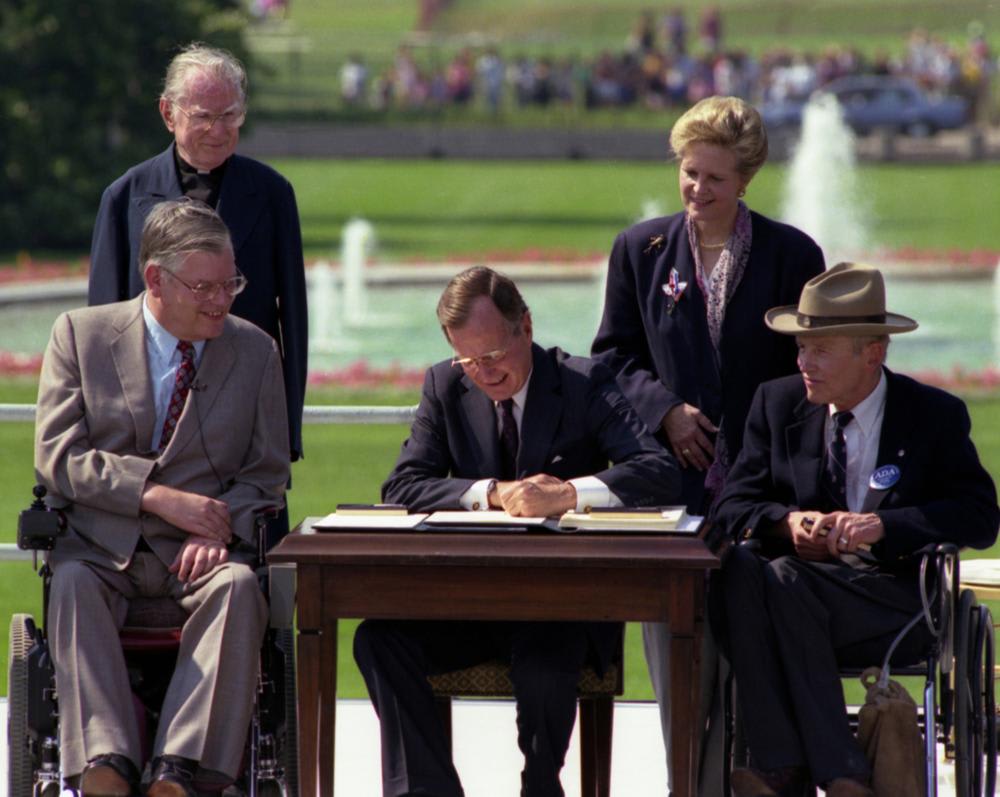
Pictured from left to right: (seated) are Evan Kemp, then Chairman of the EEOC, the Reverend Harold Wilke, a United Church of Christ minister born without arms and an early leading disability rights advocate, President Bush signing, Sandra Parrino, the then White House Press Secretary, and Justin Dart (seated), the country’s then leading disability rights activist and widely credited for causing the ADA to pass into law.
In his 1990 speech introducing the Act, President Bush stated, “The Americans with Disabilities Act presents us all with an historic opportunity. It signals the end to the unjustified segregation and exclusion of persons with disabilities from the mainstream of American life. As the Declaration of Independence has been a beacon for people all over the world seeking freedom, it is my hope that the Americans with Disabilities Act will likewise come to be a model for the choices and opportunities of future generations around the world.”

- information about disability rights and responsibilities in the workplace
- a short description of the ADA
- a selection of resources to assist applicants, employees, employers (including small businesses), staffing firms, and veterans with disabilities to better understand the ADA
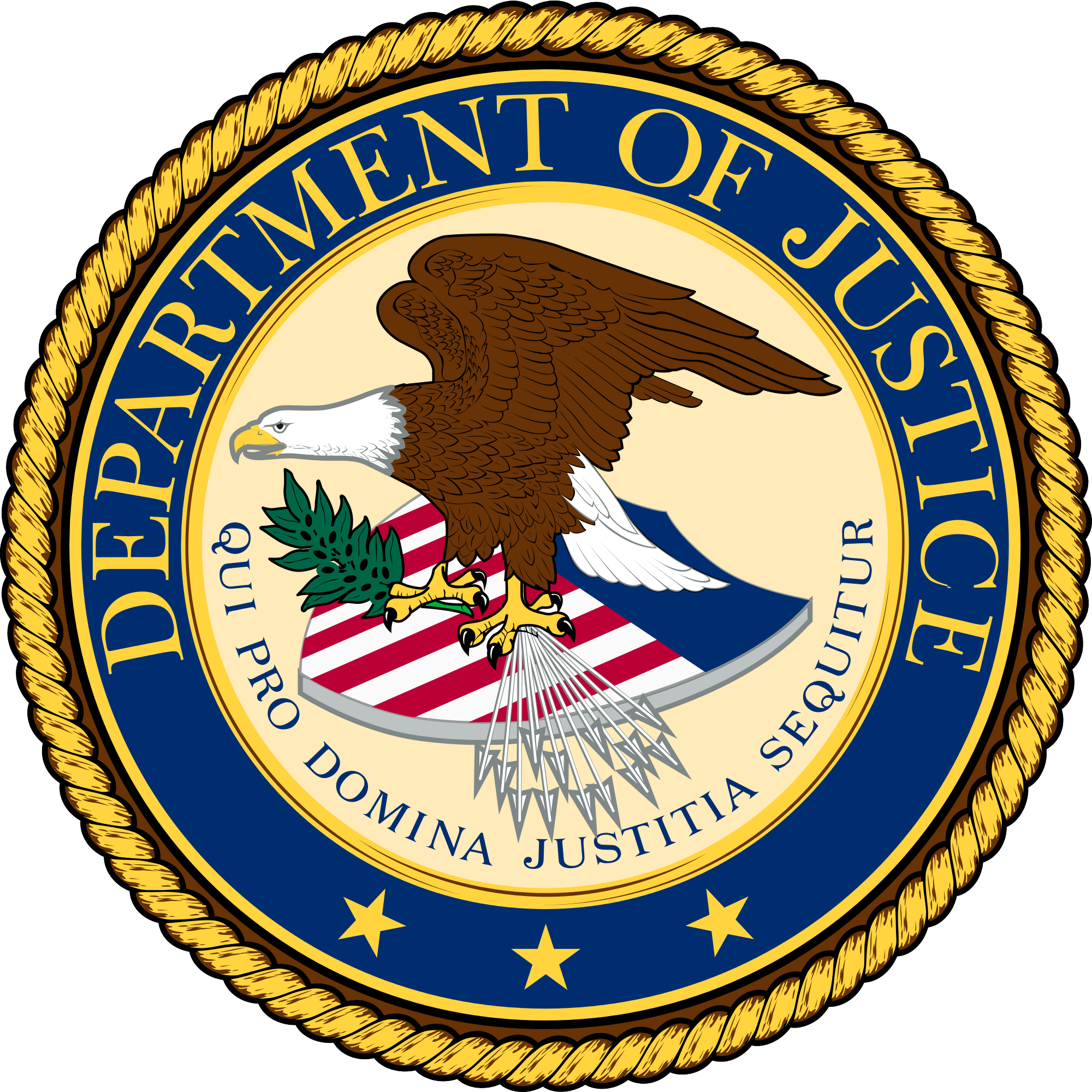
As Eric S. Dreiband, the Assistant Attorney General in charge of the Civil Rights Division, recently stated, “We are dedicated to the equal dignity of individuals with disabilities and will take action against anyone who violates federal law in dispensing healthcare in response to COVID-19. The Americans with Disabilities Act . . . protects the right of individuals with disabilities to have access to healthcare on the same basis as nondisabled people.”
Read more about the recent wins from the DOJ’s Barrier-Free Health Care Initiative. This initiative allows the U.S. Attorneys’ Offices across the country to partner with the DOJ’s Civil Rights Division to ensure that individuals with disabilities can access health care.
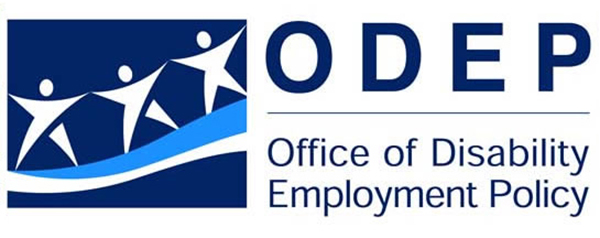
Jennifer Sheehy, Deputy Assistant Secretary of Labor for Disability Employment Policy, wrote a blog titled, “#ADA30: Increasing Access and Opportunity and the Thrill of Discovering What You Can Do.” In the blog, Sheehy, a competitive swimmer permanently injured when a fellow swimmer clowning around at pool’s edge unexpectedly pushed her back into the pool, shares her personal story about the effect the ADA has had on her life and discussed the importance of equal access and opportunity for all Americans.

- Webinar 1: The Legacy of the ADA: Celebrating 30 Years of Increasing Access and Opportunity! Thursday, July 30th from 12:00 p.m. – 1:30 p.m. EST
- Webinar 2: The State as a Model Employer (SAME) of People with Disabilities (Aug. 13)
- Webinar 3: Getting Ready for Work – Youth Transition and Guideposts for Success (Sept. 10)
- Webinar 4: Stay-at-Work/Return-to-Work Policy and Practice (Sept. 24)
- Webinar 5: Accessible Transportation and Workplace Technology (Oct. 15)
- Webinar 6: Ensuring a Disability Perspective in State Policy (Nov. 19)

THIS COLUMN IS MEANT TO ASSIST IN A GENERAL UNDERSTANDING OF THE CURRENT LAW AND PRACTICE RELATING TO OFCCP. IT IS NOT TO BE REGARDED AS LEGAL ADVICE. COMPANIES OR INDIVIDUALS WITH PARTICULAR QUESTIONS SHOULD SEEK ADVICE OF COUNSEL.
SUBSCRIBE.
Compliance Alerts
Compliance Tips
Week In Review (WIR)
Subscribe to receive alerts, news and updates on all things related to OFCCP compliance as it applies to federal contractors.
OFCCP Compliance Text Alerts
Get OFCCP compliance alerts on your cell phone. Text the word compliance to 55678 and confirm your subscription. Provider message and data rates may apply.

